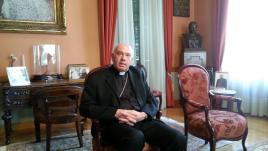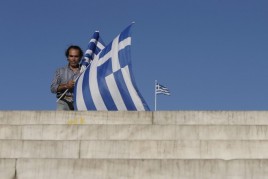
“The courage of peace through the strength of weakness. The history of Greece significantly marked the history of the Mediterranean Sea which today, unfortunately, no longer responds to its vocation as a space for encounter and interaction. Its shores are plagued by wars, tensions and crises that have been raging for years. I hope that unitary prospects of commitment will emerge from Bari with a view to social development, removing injustices and inequalities and transforming the Mare Nostrum into a frontier of peace.”
 The words of the President of Greek Bishops Msgr. Sevastianos Rossolatos, encompass the significance of the meeting sponsored by Italian Bishops (CEI) in Bari next February 19-23, titled “Mediterranean, frontier of peace.” Msgr. Rossolatos is among the group of bishops from 20 Countries bordering the Mediterranean who will attend this veritable “Synod on the Mediterranean”. The prophecy of the “holy” mayor of Florence, Giorgio La Pira, who regarded the Mediterranean as the “great lake of Tiberias”, is now threatened by wars sparked off by partisan interests, by particularisms marked by “colonialist logic promoted by world powers.”
The words of the President of Greek Bishops Msgr. Sevastianos Rossolatos, encompass the significance of the meeting sponsored by Italian Bishops (CEI) in Bari next February 19-23, titled “Mediterranean, frontier of peace.” Msgr. Rossolatos is among the group of bishops from 20 Countries bordering the Mediterranean who will attend this veritable “Synod on the Mediterranean”. The prophecy of the “holy” mayor of Florence, Giorgio La Pira, who regarded the Mediterranean as the “great lake of Tiberias”, is now threatened by wars sparked off by partisan interests, by particularisms marked by “colonialist logic promoted by world powers.”
The crisis is not over. “Greece is not immune to these risks”, the Archbishop of Athens told SIR. “Our country is struggling but it is also determined to break the shackles of an economic and financial crisis that brought it to its knees. Indeed, the efforts for recovery are not over. But we see significant signs of change and renewal such as the recent election of magistrate Ekaterini Sakellaropoulou, the nation’s first female President. This is a positive sign for the entire Country, indicating that the time is ripe and that Greek society is in the process of opening up. This appointment – he added – is conducive to reuniting the Country. It’s an important step along the path of recovery. In order to overcome the crisis once and for all we must recognize the value of every competent person.” The local Catholic Church is also making a concrete contribution, having gained recognition “from the political world.”
“In 2014, after years of hard work, the Catholic Church was granted legal personality. I was recently asked to give a speech to Parliament on trafficking in human beings. I consider it a significant gesture of openness. There is mention also of a visit to Greece by Pope Francis and by the Ecumenical Patriarch Bartholomew, but nothing has been officially announced yet.”
On the front line. This major effort nevertheless presents a number of challenges: “Relations with the Orthodox Church, taxes, incoming migrants and refugees fleeing war, shortage of funds to support our mission” and paradoxically “increasing numbers of believers.” “In the last 30 years – Bishop Rossolatos said- the Greek Catholic Church grew from 50,000 to about 300,000 faithful (on a population of over 11 million inhabitants, ed.’s note), 75% of whom are immigrants, 25% Greeks. This increase is changing the face of the local Church.” It is estimated that half of all Catholic parish priests in Greece are foreign nationals – Poles, Romanians, some Italians. Holy Mass is celebrated in Greek Catholic churches for Filipino, Polish, African and other communities. “This is a positive sign, but there is a need for priests who speak the language of migrants. The latter settle down where there are jobs, not where there is a church. Hence the need to build places of worship near their homes, but this involves expenses that we cannot afford. The tax burden exceeds 50%, greatly diminishing our capacity to help and our pastoral activities.”
 The war in Iraq followed by the war in Syria drove tens of thousands of refugees to reach Greece via Turkey. Also in this case the Greek Catholic Church, with Caritas, and the support of other Churches and humanitarian agencies, is at the front line of relief efforts. “It’ s a difficult task – the archbishop stressed – aimed also at integration, finding a job, a home. Not to mention that hundreds of thousands of unemployed Greeks are struggling to make a living. Unfortunately the EU, which speaks of solidarity, has closed its doors and so there is little we can do as compared to real needs.”
The war in Iraq followed by the war in Syria drove tens of thousands of refugees to reach Greece via Turkey. Also in this case the Greek Catholic Church, with Caritas, and the support of other Churches and humanitarian agencies, is at the front line of relief efforts. “It’ s a difficult task – the archbishop stressed – aimed also at integration, finding a job, a home. Not to mention that hundreds of thousands of unemployed Greeks are struggling to make a living. Unfortunately the EU, which speaks of solidarity, has closed its doors and so there is little we can do as compared to real needs.”
A poor Church, a mission Church. In Bari, Monsignor Rossolatos will point out that “in a certain way, Greece is a part of the Holy Land, because – he said – the route followed by Saint Paul, Apostle to the Gentiles, passed through Greece. This commits us to foster relations and dialogue with the Orthodox Church”. “Ecumenism represents a challenging ambit – the prelate remarked.
In Greece there is a widespread mentality of contempt for the Catholic Church and, hence, of fear.
 We must attempt to overcome fanaticism against us. The Orthodox population only knows the Catholic Church from what they are told by some religious fanatics. There are no ecumenical relations but only good personal relations between the faithful, between priests and bishops. Members of the Orthodox clergy who are more open-minded are yet unable to influence others. For our part we are open towards the Orthodox Church, respectful, seeking to work together whenever possible.
We must attempt to overcome fanaticism against us. The Orthodox population only knows the Catholic Church from what they are told by some religious fanatics. There are no ecumenical relations but only good personal relations between the faithful, between priests and bishops. Members of the Orthodox clergy who are more open-minded are yet unable to influence others. For our part we are open towards the Orthodox Church, respectful, seeking to work together whenever possible.
“The meeting in Bari will offer an opportunity for exchange and for sharing – the Archbishop said -. We will express the weakness of our Church, but as Saint Paul reminds us, ‘when we are weak, then we are strong.’
The courage of peace can draw from the strength of weakness.
Our Church needs help. Ours is a mission Church that prays to reawaken values of closeness and solidarity in others. Only in this way can the Mediterranean be a frontier of peace.”









